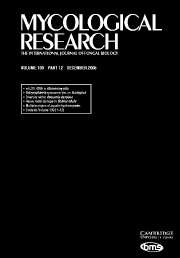Crossref Citations
This article has been cited by the following publications. This list is generated based on data provided by
Crossref.
Perotto, Silvia
Girlanda, Mariangela
and
Martino, Elena
2002.
Diversity and Integration in Mycorrhizas.
p.
41.
Baldrian, Petr
2003.
Interactions of heavy metals with white-rot fungi.
Enzyme and Microbial Technology,
Vol. 32,
Issue. 1,
p.
78.
2003.
Fungi in Ecosystem Processes.
2003.
Fungi in Ecosystem Processes.
Dixon, Kingsley W.
Sivasithamparam, K.
and
Read, David J.
2004.
Microorganisms in Plant Conservation and Biodiversity.
p.
227.
Martino, Elena
Cerminara, S TEFANO
Prandi, Laura
Fubini, Bice
and
Perotto, Silvia
2004.
Physical and biochemical interactions of soil fungi with asbestos fibers.
Environmental Toxicology and Chemistry,
Vol. 23,
Issue. 4,
p.
938.
Vallino, Marta
Drogo, Vanessa
Abba’, Simona
and
Perotto, Silvia
2005.
Gene expression of the ericoid mycorrhizal fungus Oidiodendron maius in the presence of high zinc concentrations.
Mycorrhiza,
Vol. 15,
Issue. 5,
p.
333.
Fomina, Marina
Gadd, Geoffrey
and
Burford, Euan
2005.
The Fungal Community.
Vol. 20050554,
Issue. ,
p.
733.
Gibson, Brian R.
and
Mitchell, Derek T.
2005.
Influence of pH on copper and zinc sensitivity of ericoid mycobionts in vitro.
Mycorrhiza,
Vol. 15,
Issue. 3,
p.
231.
Bellion, Marc
Courbot, Mikaël
Jacob, Christophe
Blaudez, Damien
and
Chalot, Michel
2006.
Extracellular and cellular mechanisms sustaining metal tolerance in ectomycorrhizal fungi.
FEMS Microbiology Letters,
Vol. 254,
Issue. 2,
p.
173.
Gadd, Geoffrey M.
2007.
Geomycology: biogeochemical transformations of rocks, minerals, metals and radionuclides by fungi, bioweathering and bioremediation.
Mycological Research,
Vol. 111,
Issue. 1,
p.
3.
Martino, Elena
Murat, Claude
Vallino, Marta
Bena, Andrea
Perotto, Silvia
and
Spanu, Pietro
2007.
Imaging mycorrhizal fungal transformants that express EGFP during ericoid endosymbiosis.
Current Genetics,
Vol. 52,
Issue. 2,
p.
65.
2008.
Mycorrhizal Symbiosis.
p.
637.
Genre, Andrea
Ortu, Giuseppe
Bertoldo, Chiara
Martino, Elena
and
Bonfante, Paola
2009.
Biotic and Abiotic Stimulation of Root Epidermal Cells Reveals Common and Specific Responses to Arbuscular Mycorrhizal Fungi
.
Plant Physiology,
Vol. 149,
Issue. 3,
p.
1424.
Chen, Yuh-Shuen
Liu, Bing-Lan
and
Chang, Yaw-Nan
2011.
Effects of light and heavy metals on Cordyceps militaris fruit body growth in rice grain-based cultivation.
Korean Journal of Chemical Engineering,
Vol. 28,
Issue. 3,
p.
875.
Perotto, S.
Martino, E.
Abbà, S.
and
Vallino, M.
2012.
Fungal Associations.
p.
255.
LEUNG, Ho-Man
WANG, Zhen-Wen
YE, Zhi-Hong
YUNG, Kin-Lam
PENG, Xiao-Ling
and
CHEUNG, Kwai-Chung
2013.
Interactions Between Arbuscular Mycorrhizae and Plants in Phytoremediation of Metal-Contaminated Soils: A Review.
Pedosphere,
Vol. 23,
Issue. 5,
p.
549.
2016.
Fungi in Ecosystem Processes, Second Edition.
p.
263.
Daghino, Stefania
Martino, Elena
and
Perotto, Silvia
2016.
Model systems to unravel the molecular mechanisms of heavy metal tolerance in the ericoid mycorrhizal symbiosis.
Mycorrhiza,
Vol. 26,
Issue. 4,
p.
263.
Zhang, Zhenming
Wu, Xianliang
Tu, Chenglong
Huang, Xianfei
Zhang, JiaChun
Fang, Hui
Huo, Honghao
and
Lin, Changhu
2020.
Relationships between soil properties and the accumulation of heavy metals in different Brassica campestris L. growth stages in a Karst mountainous area.
Ecotoxicology and Environmental Safety,
Vol. 206,
Issue. ,
p.
111150.




